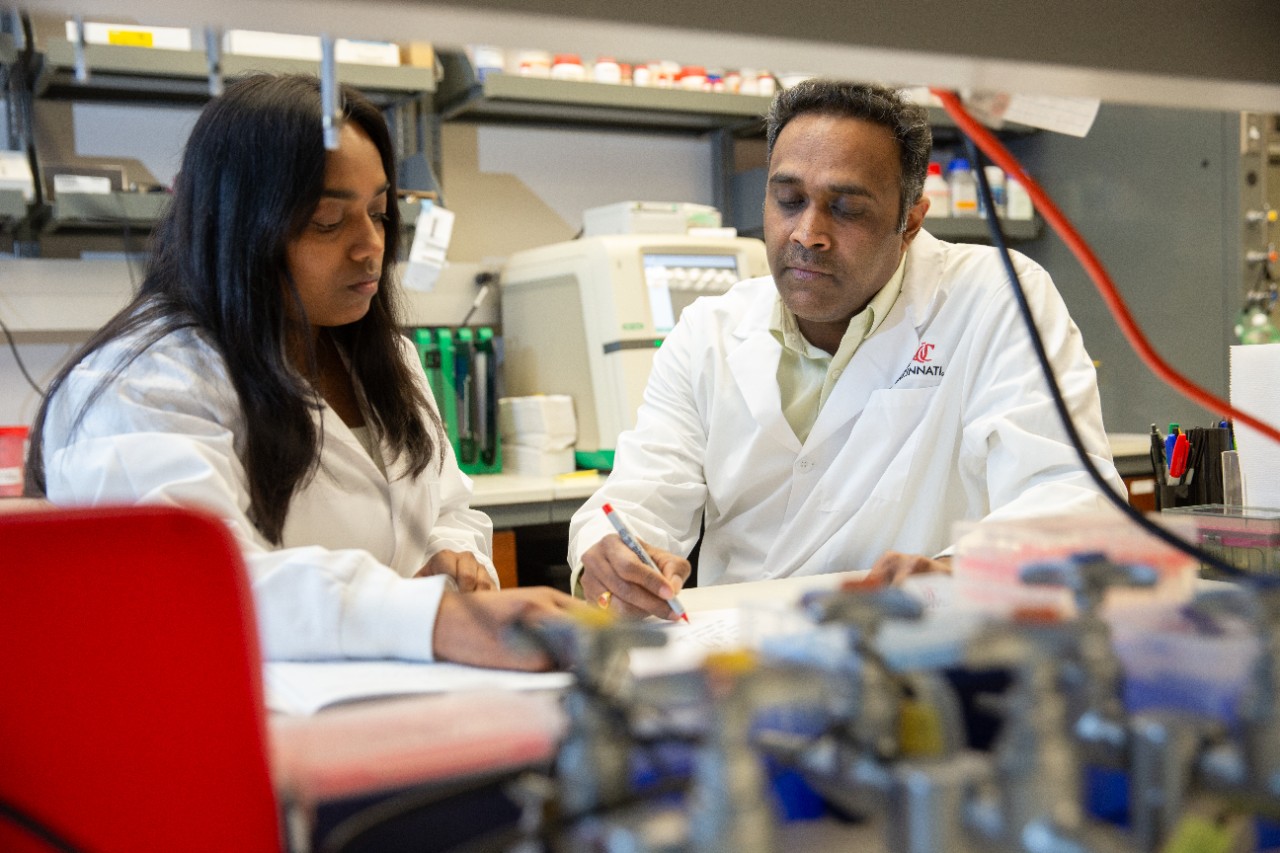
Spectrum News: New study finds molecule to help treat asthma
UC researcher's battle with the condition as a child inspired research
For Satish Madala, MD, of the Division of Pulmonary, Critical Care and Sleep Medicine at the UC College of Medicine, his research into asthma treatments comes from personal experience, having been diagnosed with asthma as a child. He lead a just-published study that identifies a molecule that could lead to improved treatments for asthma.
In an interview with Spectrum News for a story on the study, Madala said, "Asthma usually attacks late in the night. It keeps you awake, it gives you sleepless nights."
Madala says this is because your immune system is trying to fight off allergens.

Satish Madala, PhD, in the Department of Pulmonary, Critical Care and Sleep Medicine at the UC College of Medicine/Photo/Andrew Higley/UC Marketing + Brand
"Your airways become narrow," said Madala. "When they become narrow, you can't take enough of the oxygen you need. So that's why kids cannot sleep, or even adults, when they have an asthma attack, they cannot breathe."
Matish lead a team of doctors and researchers at UC who collaborated with researchers at Cincinnati Children's on a study to help discover better treatment for asthma.
Through their study, they found that a protein called interleukin 31 receptor is what is needed to help people with asthma breathe easier. And now they’re looking to see what other elements are needed to make it effectively work for treatment.
Madala and his team are now trying to figure out what other elements are needed for the treatment to work effectively.
“We need to understand where that binding is happening,” said Madala. “So then we can develop a drug molecule that can prevent that interaction. So that so we can uncouple these interactions that drive that contractility. So then that molecule becomes a therapy for these patients.”
See the entire Spectrum story here.
Read more about Madala's research here.
Lead photo of Madala and graduate student Santhoshi Akkenapally/Andrew Higley/UC Marketing + Brand
Next Lives Here
The University of Cincinnati is classified as a Research 1 institution by the Carnegie Commission and is ranked in the National Science Foundation's Top-35 public research universities. UC's graduate students and faculty investigate problems and innovate solutions with real-world impact. Next Lives Here.
Related Stories
2021 University Recognition Ceremony honors student achievements
April 13, 2021
The University of Cincinnati recognizes students each year who have made significant service, leadership, and academic contributions to the UC community. These students exemplify the spirit of what it means to be a Bearcat.
UC Day of Giving a success
April 28, 2021
University of Cincinnati Day of Giving’s 24-hour challenge was a tremendous success this year, raising $2,219,197 with 3,232 gifts. The fourth annual UC Day of Giving raised its most money to date with alumni, donors, students, faculty and staff joining together to support UC and UC Health.
President picks exceptional talent
April 28, 2021
The University of Cincinnati 2021 Presidential Leadership Medal of Excellence Awards honor six undergraduate scholars for scholarship, leadership, character, service and the ideals of the university. Awardees are spotlighted for exceptional academics, creativity, community service and innovation.
Grad students earn president's highest honor
April 28, 2021
The University of Cincinnati 2021 Presidential Medal of Graduate Student Excellence Awards honor three graduate scholars for scholarship, leadership, character, service and the ideals of the university. Awardees are spotlighted for exceptional academics, creativity, community service and innovation.
GIVEHOPE and BSI Engineering Celebrate Ten Years of Driving Research
August 3, 2021
Years after two personal losses from pancreatic cancer, Cincinnati-based nonprofit GIVEHOPE and consulting firm BSI Engineering are celebrating a philanthropic partnership that has funded 13 pilot research projects at the University of Cincinnati Cancer Center.
Finding community and building a future
July 9, 2021
As a University of Cincinnati College of Medicine student, Sarah Appeadu, MD, ’21, remembers journaling on the “3 Cs” that got her through medical school: Community, community, community. Now, when she lists the people who supported her through four years of training—the last year in a global pandemic—it keeps growing: her family, her church, her classmates, and the college’s Office of Student Affairs and Office of Diversity, Equity and Inclusion. “I look back and it was such a crucial time to really be nurtured in that way,” she says. “I’m so thankful that I had those people. It shows being around the right people really mattered. That’s my same hope for residency even.”
UC to honor 2,079 grads at summer Commencement
August 2, 2021
UC celebrates the 2021 summer Commencement on Friday in two ceremonies at Fifth Third Arena. On Saturday, UC will recognize 2020 grads with an in-person Commencement celebration.
New York Times: Flint Weighs Scope of Harm to Children Caused by Lead in Water
February 1, 2016
Kim Dietrich, a professor of environmental health at UC's College of Medicine, is quoted in this story on the medical problems that could develop among the thousands of young children exposed to lead-contaminated water in Flint, Mich.
Cancer-Causing Gene Found in Plasma May Help Predict Outcomes for Patients
February 18, 2016
Researchers at the University of Cincinnati have discovered that a human cancer-causing gene, called DEK, can be detected in the plasma of head and neck cancer patients.
UC Receives $1.9 Million to Study Pain
February 15, 2016
Jun-Ming Zhang, MD, of the UC College of Medicine, is the principal investigator of a $1.95 million grant to study the interacting roles of the sympathetic and sensory nervous and immune systems in back and neuropathic pain models.
